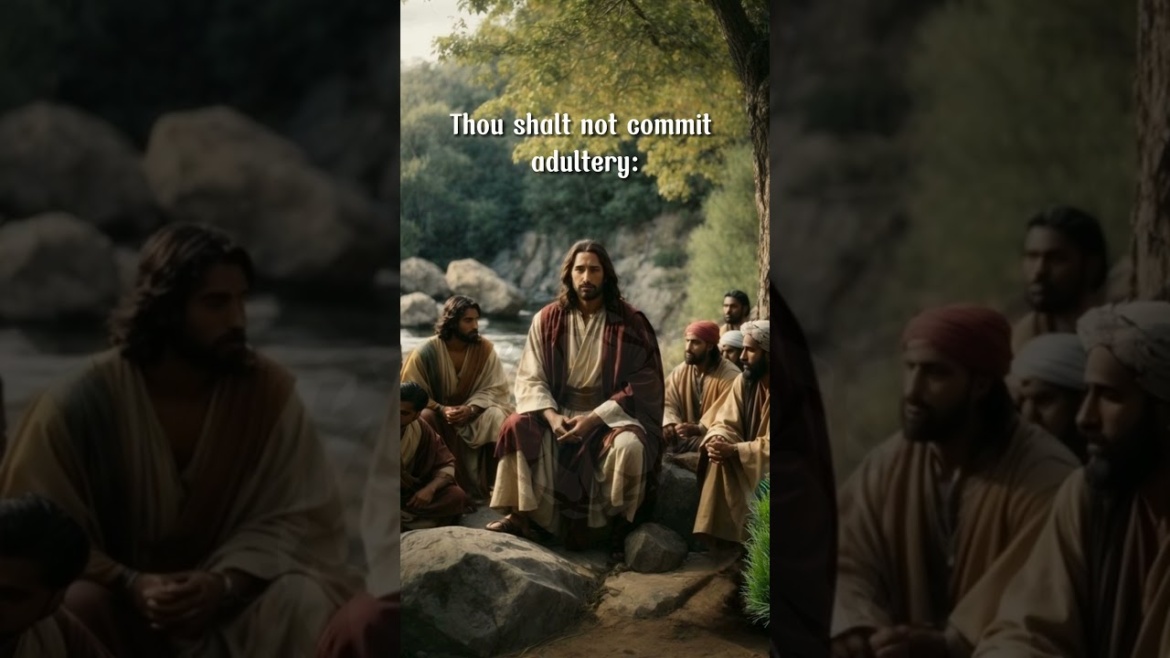The Significance of “Ye have heard that it was said by them of old time, Thou shalt not commit adultery: But I say unto you, That whosoever looketh on a woman to lust after her hath committed adultery with her already in his heart.”
The phrase “Ye have heard that it was said by them of old time, Thou shalt not commit adultery: But I say unto you, That whosoever looketh on a woman to lust after her hath committed adultery with her already in his heart.” is a powerful christian law used by Jesus in Matthew 5:27-28 from the Sermon on the Mount, where he challenges and expands on existing Jewish law. Here, he addresses the commandment against adultery, not just as a physical act, but as an internal thought or desire.
Context of the Phrase
The law appears within Jesus’ Sermon on the Mount, a collection of teachings focusing on right living and morality for spreading God’s message. The law “Ye have heard that it was said by them of old time, Thou shalt not commit adultery: But I say unto you, That whosoever looketh on a woman to lust after her hath committed adultery with her already in his heart.” comes from the Sermon on the Mount in the Gospel of Matthew 5:27-28, represents a key moment in Jesus’ teachings, where he challenges the traditional interpretation of the Moses Law, specifically the Ten Commandments, included the prohibition of adultery. This was understood primarily as a physical act of sexual infidelity. However, Jesus goes beyond this external interpretation and delves into the internal realm of thought and desire. He suggests that lustful intent, even without physical action, is already a violation of the spirit of the law.
Significance of the Phrase
The law “Ye have heard that it was said by them of old time, Thou shalt not commit adultery: But I say unto you, That whosoever looketh on a woman to lust after her hath committed adultery with her already in his heart.” elevates the importance of internal spirit. It emphasizes that our intentions of internal spirit determine our thoughts and actions. It highlights that adultery is not just about physical betrayal but also about harboring lustful thoughts and desires. This challenges us to control our own thoughts and those of others.
Here are some key points:
Call to purity: It is calling for a deeper purity of intentions, where even thoughts that go unexpressed are held accountable.
Challenge to legalism: It challenges the legalistic interpretation of the Law, which focused on outward actions rather than inward thoughts.
Need to struggle: It acknowledges the human capacity for temptation and the need for self-control over even internal thoughts.
Application of the Phrase
The law “Ye have heard that it was said by them of old time, Thou shalt not commit adultery: But I say unto you, That whosoever looketh on a woman to lust after her hath committed adultery with her already in his heart.” has different Interpretations between denominations and individuals. Some understand it literally, while others see it as a metaphorical illustration of the need for a pure heart. Regardless of interpretation, it remains a powerful call for self-reflection, self-respect and self-control.
The law can be applied in various ways:
Self-reflection: It prompts us to examine our own thoughts and desires, to realize that even fleeting moments of lust can be harmful.
Self-respect: It encourages us to treat others with respect and regardless of their gender or attractiveness, to recognize their inherent dignity.
Self-control: It calls us to develop self-control and managing our desires, to avoid causing harm to ourselves or others.
Ultimately, the application of the law requires careful consideration of its context, significance and potential interpretations within one’s own religious or ethical framework.
THE CHILD IS INTENDED INTO ONE SUB & NINE EXTREMES
« Samsara Extreme Of Heaven In Child Intended To Exist »
WHAT IS ✨ COLD CHILD SPACE? IT IS JUST CHILD EXTREME!
« Child Extreme’s Code & subExtreme’s Law »














2 Comments
God’s Hand Link
@iancaldeian
“Who the fuck speaks old English in a modern English setting. It’s like speaking French to English speaking people. Then all the fools say, “Amen” because they’re taught to think this is sophisticated. SMDH”
God’s Hand Link
@iancaldeian
“Who the fuck speaks old English in a modern English setting. It’s like speaking French to English speaking people. Then all the fools say, “Amen” because they’re taught to think this is sophisticated. SMDH”
https://en.wikipedia.org/wiki/King_James_Version
“The King James Version (KJV), also the King James Bible (KJB) and the Authorized Version (AV) is an Early Modern English translation of the Christian Bible for the Church of England, which was commissioned in 1604 and published in 1611, by sponsorship of King James VI and I.[d][e] The 80 books of the King James Version include 39 books of the Old Testament, 14 books of Apocrypha, and the 27 books of the New Testament.
👉Noted for its “majesty of style”, the King James Version has been described as one of the most important books in English culture and a driving force in the shaping of the English-speaking world.[3][4] The King James Version remains the preferred translation of many Christian fundamentalists and religious movements, and it is also considered to be one of the important literary accomplishments of early modern England.👈
The KJV was first printed by John Norton and Robert Barker, who both held the post of the King’s Printer, and was the third translation into the English language approved by the English Church authorities: The first had been the Great Bible, commissioned in the reign of King Henry VIII (1535), and the second had been the Bishops’ Bible, commissioned in the reign of Queen Elizabeth I (1568).[5] In Geneva, Switzerland, the first generation of Protestant Reformers had produced the Geneva Bible[6] which was published in 1560 by Sir Rowland Hill[7] having referred to the original Hebrew and Greek scriptures, which was influential in the writing of the Authorized King James Version. The English Church initially used the officially sanctioned “Bishops’ Bible”, which, however, was hardly used by the population. More popular was the named “Geneva Bible”, which was created on the basis of the Tyndale translation in Geneva under the direct successor of the reformer John Calvin for his English followers. However, their footnotes represented a Calvinistic Puritanism that was too radical for King James. In particular, the decidedly anti-royalist tone of the Geneva Bible was unbearable for King James I, for he was a strict advocate of divine right. The translators of the Geneva Bible had translated the word king as tyrant about four hundred times—the word tyrant does not appear once in the KJB. Because of this, it has been assumed that King James purposely had the translators of the KJV mistranslate the word “tyrant” as either “troubling”, “oppressor,” or some other word to avoid people being critical of his monarchy, though there is no evidence to back up that claim.[8] For his project, King James convened the Hampton Court Conference in January 1604, where a new English version was conceived in response to the problems of the earlier translations perceived by the Puritans,[9] a faction of the Church of England.[10] James gave the translators instructions intended to ensure that the new version would conform to the ecclesiology, and reflect the episcopal structure, of the Church of England and its belief in an ordained clergy.[11] 👉The translation was done by six panels of translators (47 men in all, most of whom were leading biblical scholars in England) who had the work divided up between them: the Old Testament was entrusted to three panels, the New Testament to two, and the Apocrypha to one.[12] In common with most other translations of the period, the New Testament was translated from Greek, the Old Testament from Hebrew and Aramaic, and the Apocrypha from Greek and Latin.👈 In the 1662 Book of Common Prayer, the text of the Authorized Version replaced the text of the Great Bible for Epistle and Gospel readings (but not for the Psalter, which substantially retained Coverdale’s Great Bible version), and as such was authorized by Act of Parliament.[13]
By the first half of the 18th century, the Authorized Version had become effectively unchallenged as the only English translation used in Anglican and other English Protestant churches, except for the Psalms and some short passages in the Book of Common Prayer of the Church of England. Over the course of the 18th century, the Authorized Version supplanted the Latin Vulgate as the standard version of scripture for English-speaking scholars. With the development of stereotype printing at the beginning of the 19th century, this version of the Bible had become the most widely printed book in history, almost all such printings presenting the standard text of 1769 extensively re-edited by Benjamin Blayney at Oxford, and nearly always omitting the books of the Apocrypha. Today the unqualified title “King James Version” usually indicates this Oxford standard text.”
Ecclesiastes 3:1-22
“To every thing there is a season, and a time to every purpose under the heaven:
A time to be born, and a time to die; a time to plant, and a time to pluck up that which is planted;
A time to kill, and a time to heal; a time to break down, and a time to build up;
A time to weep, and a time to laugh; a time to mourn, and a time to dance;
A time to cast away stones, and a time to gather stones together; a time to embrace, and a time to refrain from embracing;
A time to get, and a time to lose; a time to keep, and a time to cast away;
A time to rend, and a time to sew; a time to keep silence, and a time to speak;
A time to love, and a time to hate; a time of war, and a time of peace.
What profit hath he that worketh in that wherein he laboureth?
I have seen the travail, which God hath given to the sons of men to be exercised in it.
He hath made every thing beautiful in his time: also he hath set the world in their heart, so that no man can find out the work that God maketh from the beginning to the end.
I know that there is no good in them, but for a man to rejoice, and to do good in his life.
And also that every man should eat and drink, and enjoy the good of all his labour, it is the gift of God.
I know that, whatsoever God doeth, it shall be for ever: nothing can be put to it, nor any thing taken from it: and God doeth it, that men should fear before him.
That which hath been is now; and that which is to be hath already been; and God requireth that which is past.
And moreover I saw under the sun the place of judgment, that wickedness was there; and the place of righteousness, that iniquity was there.
I said in mine heart, God shall judge the righteous and the wicked: for there is a time there for every purpose and for every work.
I said in mine heart concerning the estate of the sons of men, that God might manifest them, and that they might see that they themselves are beasts.
For that which befalleth the sons of men befalleth beasts; even one thing befalleth them: as the one dieth, so dieth the other; yea, they have all one breath; so that a man hath no preeminence above a beast: for all is vanity.
All go unto one place; all are of the dust, and all turn to dust again.
Who knoweth the spirit of man that goeth upward, and the spirit of the beast that goeth downward to the earth?
Wherefore I perceive that there is nothing better, than that a man should rejoice in his own works; for that is his portion: for who shall bring him to see what shall be after him?”
Corinthians 3:16
“Know ye not that ye are the temple of God, and that the Spirit of God dwelleth in you?”
John 10:27
“My sheep hear my voice, and I know them, and they follow me.”
Revelation 22:12
“And, behold, I come quickly; and my reward is with me, to give every man according as his work shall be.”
Matthew 24:36
“But of that day and hour knoweth no man, no, not the angels of heaven, but my Father only.”
Revelation 22:13-21
“I am Alpha and Omega, the beginning and the end, the first and the last.
Blessed are they that do his commandments, that they may have right to the tree of life, and may enter in through the gates into the city.
For without are dogs, and sorcerers, and whoremongers, and murderers, and idolaters, and whosoever loveth and maketh a lie.
I Jesus have sent mine angel to testify unto you these things in the churches. I am the root and the offspring of David, and the bright and morning star.
And the Spirit and the bride say, Come. And let him that heareth say, Come. And let him that is athirst come. And whosoever will, let him take the water of life freely.
For I testify unto every man that heareth the words of the prophecy of this book, If any man shall add unto these things, God shall add unto him the plagues that are written in this book:
And if any man shall take away from the words of the book of this prophecy, God shall take away his part out of the book of life, and out of the holy city, and from the things which are written in this book.
He which testifieth these things saith, Surely I come quickly. Amen. Even so, come, Lord Jesus.
The grace of our Lord Jesus Christ be with you all. Amen.”
LISTEN TO GOD’S VOICE TO HEAR GOD’S WORD
Refer link: https://godshand.link/hear-gods-word/#/p/kjv/Ecclesiastes/3
Refer link: https://godshand.link/hear-gods-word/#/context/kjv/1.Corinthians/3/16
Refer link: https://godshand.link/hear-gods-word/#/context/kjv/John/10/27
Refer link: https://godshand.link/hear-gods-word/#/context/kjv/Revelation/22/12
Refer link: https://godshand.link/hear-gods-word/#/context/kjv/Matthew/24/36
Refer link: https://godshand.link/hear-gods-word/#/p/kjv/Revelation/22
Thanks For Helping To Decode Occult Science!